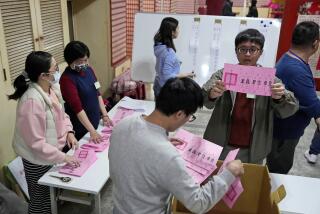Taiwan Ruling Party Maintains Ballot Strength
- Share via
TAIPEI, Taiwan — The ruling Kuomintang (Nationalist) Saturday managed to maintain its electoral strength on Taiwan in the first test of its popularity since the regime headed by President Chiang Ching-kuo was buffeted by a recent series of political and economic scandals.
In polling for local and provincial government officies, the Chinese Nationalist candidates garnered about 70% of the popular vote, the same proportion the party received in previous elections.
Opposition candidates made small inroads in the capital of Taipei, winning 13 of the 51 seats on the city council, a gain of three. Hsieh Chang-ting, 39, a lawyer who campaigned against the Nationalists using Lord Acton’s admonition that “absolute power corrupts absolutely,” not only won a seat but the most votes in his district.
However, the Kuomintang also defeated some well-known government critics. In southern Taiwan, Chen Shui-pien, a magazine publisher who has attacked “the Kuomintang’s 40 years of occupation,”, lost in his bid for a county magistrate’s seat.
The election was Taiwan’s first since the regime’s former intelligence chief was convicted last spring of plotting the murder in Daly City, Calif., of Chinese-American writer Henry Liu. In addition, early this year, Taiwan’s biggest savings and loan institution collapsed after disclosures of lending irregularities.
Never in Doubt
Despite these events, and a lagging economy, the outcome of the election was never in doubt. The Kuomintang is still the only official political party of any size permitted on the island, which has been under martial law for more than three decades. The principal uncertainty was over what percentage of the vote it would win and how large the turnout would be.
Generally, Nationalist and opposition leaders alike tended to attribute the Kuomintang’s continued strength to a splintered opposition and to an intense campaign by the ruling party this year. “They (the Kuomintang) made sure the scandals were not an issue,” said Antonio Chiang, an opposition editor. “They diverted attention away from these things.”
The election was being held to choose 21 mayors and magistrates, 77 members of the provincial assembly, 51 seats in the Taipei City Council and 42 members of the City Council of Kaohsiung, in the south. Elections for these posts were last held in 1981, and the Kuomintang holds or controls more than three-quarters of these seats.
Because Chiang’s regime considers itself the rightful government of all of China and not merely Taiwan, the island’s 19 million residents do not have an opportunity to vote for president. The governor of Taiwan province and the mayors of the two largest cities, Taipei and Kaohsiung, are also chosen through appointment rather than election.
As a result, the balloting for local officials and separate elections held for Taiwan representatives to the national legislature are considered the primary vehicles for expressions of political opinion here.
More to Read
Sign up for Essential California
The most important California stories and recommendations in your inbox every morning.
You may occasionally receive promotional content from the Los Angeles Times.













